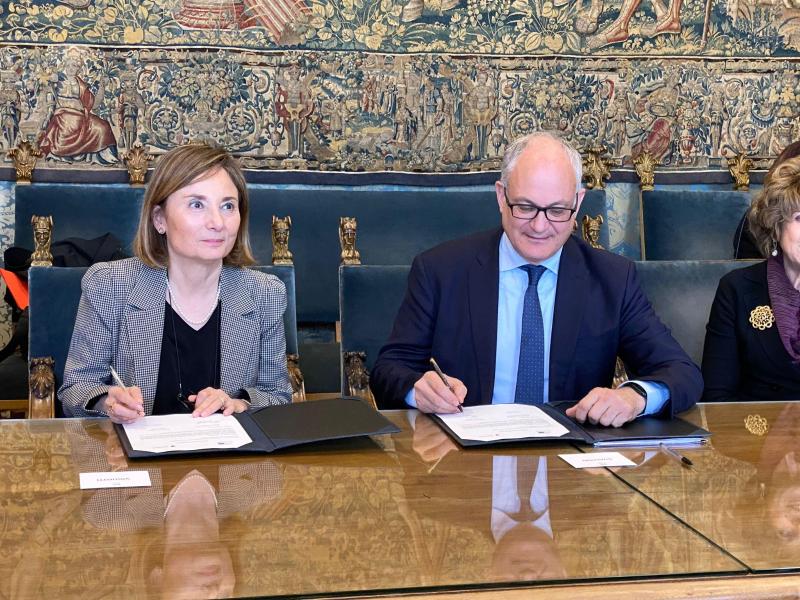
- This is the first advisory agreement signed by the EIB with an Italian municipality under the InvestEU Advisory Hub.
- The advisory services concern over €390 million of energy efficiency operations in more than 200 school buildings, including €200 million for the institutional development contract (CIS Roma) signed by the City of Rome and the government in July 2022. This is in addition to €42 million in PON Metro funds and €150 million from the EIB credit line approved in February 2023.
- EIB estimates indicate that the energy efficiency class of the buildings involved will improve by at least two categories, helping to cut CO2 emissions by around 9 900 tonnes a year.
European Investment Bank (EIB) Vice-President Gelsomina Vigliotti and Mayor of Rome Roberto Gualtieri signed a technical advisory agreement today at the Campidoglio city council building. It aims to support the resources, planning, implementation and monitoring of funds made available for operations to improve the energy efficiency of over 200 school buildings in Rome between 2023 and 2027.
The agreement is part of the €390 million of operations set to make the 212 participating schools more environmentally sustainable, modern, efficient and able to meet the requirements of pupils, teachers and families — a major contribution to Rome’s commitment to combating climate change. The resources include €200 million from CIS Roma (signed by the City of Rome and the government in July 2022), €42 million in PON Metro funds and the €150 million credit line approved by the EIB in February 2023 to support the project, which is the City of Rome’s biggest investment in school buildings in decades. The City of Rome already launched the design phase of the operations for the first 111 schools last month.
The agreement signed by the EIB and the City of Rome today is the first advisory agreement to be signed with an Italian municipality under the InvestEU Advisory Hub, a technical advisory service for the public sector run by the EIB in cooperation with the European Commission to support the further development of institutions’ internal capacities.
In concrete terms, the planned operations will involve nurseries, kindergartens, primary schools and lower secondary schools in all 15 of Rome’s districts. The energy efficiency measures include the thermal renovation of the buildings, the renewal of fixtures and air conditioning, and the replacement of lighting systems with new LED versions. The City of Rome also is also planning investments in installing renewable energy sources such as photovoltaic systems, solar thermal panels for hot water and heat pumps. EIB estimates indicate that the energy rating of the buildings involved will improve by at least two categories, helping to cut CO2 emissions by around 9 900 tonnes a year.
“The EIB is the EU climate bank, and the agreement signed today shows our solidarity and support — advisory and financial — for the energy transition in the public sector,” said EIB Vice-President Gelsomina Vigliotti. “Improving the energy efficiency class of public buildings like schools — cutting energy use and CO2 emissions — is key to achieving national and EU climate goals.”
“The redevelopment and energy efficient renovation of 212 of Rome’s schools is the biggest investment in school buildings the capital has seen in decades, making these institutions more modern, sustainable and efficient. It is among the key projects with which Rome is playing its part in preparing for the 2030 climate neutrality targets, in the spirit of a green transition creating new opportunities for the city. I would like to thank the EIB for this important agreement. The technical advisory services and financial support of such a major EU partner will give real impetus to a vital operation for the city,” said Mayor of Rome Roberto Gualtieri.
Background information
The European Investment Bank (EIB) finances projects in four priority areas: infrastructure, innovation, climate and environment, and small and medium-sized enterprises (SMEs). Between 2019 and 2022, the EIB Group provided more than €45 billion in financing for projects in Italy.
The InvestEU programme provides the European Union with long-term funding by leveraging substantial private and public funds in support of a sustainable recovery. It also helps to crowd in private investment for the European Union's strategic priorities such as the European Green Deal and the digital transition. InvestEU brings all EU financial instruments previously available for supporting investments within the European Union together under one roof, making funding for investment projects in Europe simpler, more efficient and more flexible. The programme consists of three components: the InvestEU Fund, the InvestEU Advisory Hub, and the InvestEU Portal. The InvestEU Fund is deployed through implementing partners that will invest in projects using the EU budget guarantee of €26.2 billion. The entire budget guarantee will back the investment projects of the implementing partners, increase their risk-bearing capacity and thus mobilise at least €372 billion in additional investment.